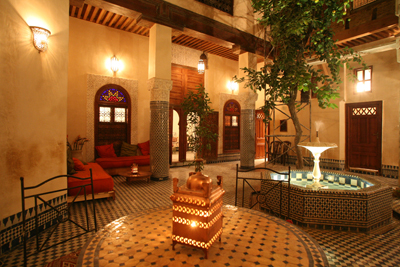 According to a Reuters report Morocco's Central Bank is more worried by inflation than by global financial markets turmoil originating in the United States.
According to a Reuters report Morocco's Central Bank is more worried by inflation than by global financial markets turmoil originating in the United States.Le Matin reports sources close to the Royal Palace as saying, "For the time being, inflation remains a cause of concern because despite efforts to keep it in check, imported inflation has an impact. Inflation through costs has an impact and creates, with wage rises, a vicious circle".
Moroccan consumer price inflation rose to a year-on-year 5.1 percent in July from 4.7 percent in June, according to latest official figures released on August 18.
The annual inflation rate was 5.4 percent in May.
In June, the government said it forecast annual inflation of 2.7-2.9 percent, up from an initial estimate of 2.0 percent.
Commenting on a sell-off on Casablanca bourse prompted early this week by fears of contagion from global financial turmoil the source says, "We are not affected by the international crisis because we do not have subprime loans in our banks. We are not concerned by the mortgage crisis and our banks do not have such assets".
Moroccan stocks, mainly property shares, tumbled this week on concern that the global credit crisis could dry up foreign investment flow in the country's fast-growing real estate market, wiping out more than 50 billion dirhams in shareholder value.
Government officials played down investor fears of possible repercussions from the international credit crisis on the local property market, insisting that the domestic sector would continue growing in the next years.
"Where is the crisis when credits to the property market had risen 33 percent in July?" asked Finance Minister Salaheddine Mezouar in the business daily L'Economiste.
Morocco is immune to the subprime crisis for several reasons, notably the fact that the financial sector does not hold securities or loans in financial institutions or international investment funds affected by subprimes, Salaheddine Mezouar said on Thursday.
Speaking at the weekly cabinet meeting on the recent developments of national economy and international environment, Mezouar said that real estate loans in Morocco are mainly fixed interest rate loans with the possibility for variable interest rate loan beneficiaries to opt for fixing these rates under regulated and predictable conditions, Communication minister and Government Spokesperson, Khalid Naciri, said in a press briefing at the end of this meeting.
The financial situation of Moroccan banking institutions has significantly improved in recent years, thanks mainly to the strengthening of banking supervision in general and the stabilization of the public financial sector in particular, the minister said, adding that the upsurge in the energy and food products had an impact on our balance of payments and our public finances.
However, he noted, thanks to government support through the fund of compensation, the effects of this upsurge has had no impact on the purchasing power of our citizens, nor on production factors.
According to the minister, real GDP rose respectively by 7% and 6.7% in the first two quarters of 2008, which would allow for a growth rate estimated at 6.8% this year.
According to a report being run by Maghreb Arabe Presse, Morocco's cost-of-living index for August has edged 4.8% from the same period of last year, the High Commission for Planning (HCP) said on Thursday.The rise is pinned on a 8.3% hike of the food product prices and a 1.8% progress of non-food product prices, the Rabat-based HCP said in its monthly bulletin.
Compared to July, the index edged 0.4%, inflated by a 0.8% rise of the food product prices and a 0.1% progress of non-food products, it said.
The year-on-year index for July had jumped 5.1% on the food price hike, which had rocketed 9.1%.
The highest rise was registered in the western city of Kenitra, with 1.3%, followed by Tangier, where the index rose 1.2% and Fez and Tetouan (1%), the commission said.
Tags: Moroccan Morocco Fes, Maghreb news

No comments:
Post a Comment